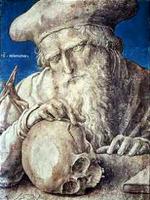 Saint Jerome (Eusebius Sophronius Hieronymus), translator of Holy Scripture, was born in a little Dalmatian village on the Adriatic Sea around the year AD 345. Although he came from Christian parents, he wasn't baptized until he went to study in Rome in about AD 360.
Saint Jerome (Eusebius Sophronius Hieronymus), translator of Holy Scripture, was born in a little Dalmatian village on the Adriatic Sea around the year AD 345. Although he came from Christian parents, he wasn't baptized until he went to study in Rome in about AD 360.
After extensive travels, he chose the life of a monk and spent five years in the Syrian desert. There he learned Hebrew, the language of the Old Testament. However, the time spent there convinced him that the life of a hermit monk was not for him and he pursued holy orders and advanced education.
After ordination at Antioch and visits to Rome and Constantinople (where he studied under Gregory of Nazianzus), Jerome settled in Bethlehem. From the original Hebrew, Aramaic, and Greek, he used his ability with languages to translate the Bible into Latin, the common language of his time.
Jerome chose to use "street" or "vulgar" Latin rather than its classical form. Thus, his translation was called the Vulgate (from its vulgar Latin) and was the authoritative version of the Bible in the western Church for over 1,000 years.
A man of considerable brilliance, Jerome could also be argumentative, arrogant, dogmatic in trivial matters, and easily swayed by people holding superior office. Yet he also was able to break with the influence of Origen under which he was raised and was a champion of understanding the original languages of Scripture and of exegesis over allegory in interpretation.
 In Roman Catholic hagiography, Jerome is patron saint of translators and librarians. His symbol in Christian symbolism is often a pen. In religious art, it isn't unusual to see him portrayed with an odd blend of clothing and trappings ranging from lean ascetic anchorite to opulently garbed cardinal. He is often posed with a crucifix, a skull, and a Bible.
In Roman Catholic hagiography, Jerome is patron saint of translators and librarians. His symbol in Christian symbolism is often a pen. In religious art, it isn't unusual to see him portrayed with an odd blend of clothing and trappings ranging from lean ascetic anchorite to opulently garbed cardinal. He is often posed with a crucifix, a skull, and a Bible.
Considered one of the great scholars of the early church, he is listed with Saints Augustine, Ambrose, and Gregory the Great as one of the original Four Doctors of the Western Church. These four, plus four Eastern theologians, compose the eight Great Doctors of the early Church (see this article on Saint Ambrose for the entire list). He died on 30 September AD 420. Originally interred at Bethlehem, his remains were eventually taken to Rome.
More information is available from James Kiefer's Hagiographies and Wikipedia.
Lection
Psalm 19:7-11(12-14) or 119:97-104
2 Timothy 3:14-17
Luke 24:44-48
Collect
O Lord, O God of truth, whose Word is a lantern to our feet and a light upon our path: We give you thanks for your servant Jerome, and those who, following in his steps, have labored to render the Holy Scriptures in the language of the people; and we pray that your Holy Spirit will overshadow us as we read the written Word, and that Christ, the living Word, will transform us according to your righteous will; through Jesus Christ our Lord, who lives and reigns with you and the Holy Spirit, one God, now and forever.
Technorati Tags: Saint Jerome | St. Jerome | Jerome | Hieronymus | Eusebius Sophronius Hieronymus | Gregory of Nazianzus | Origen | Vulgate | Latin Bible | translator | anchorite | monk | monasticism | holy orders | Doctors of the Church | patron saint | librarians | translators | Church Year | liturgical calendar | Christianity | Christian | Lutheranism | Lutheran | festivals | saints' days | biography | hagiography | commemorations | lectionary | theology | dogmatics | allegory | literal sense | exegesis | vernacular | translation | exegetical theology| Bible | Holy Bible | Scripture | Holy Scripture | Word of God | God's Word | Hebrew | Aramaic | Greek | Latin | vulgar Latin | Old Testament | New Testament | historical theology | history | Church history | Roman history | Middle Eastern history | Palestine history | Bethlehem | Rome | Constantinople | Antioch
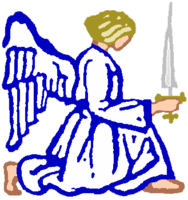 On the Feast of St. Michael and all Angels (or Michaelmas) we thank God for the many ways in which He lovingly watches over us, both directly and indirectly. We also remember that the richness and variety of God's creation far exceeds our knowledge of it.
On the Feast of St. Michael and all Angels (or Michaelmas) we thank God for the many ways in which He lovingly watches over us, both directly and indirectly. We also remember that the richness and variety of God's creation far exceeds our knowledge of it.
The angels are referred to as "messengers of God," or simply as "messengers." The word for a messenger in Hebrew is malach, in Greek, angelos, from which we get our word "angel."
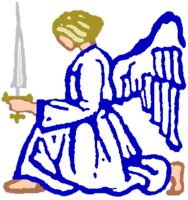 Michael (the name means "Who is like God?") is said to be the captain of the heavenly armies. In the Scriptures, Daniel (10:13, 21; 12:1) calls him prince of the people of Israel; Jude 9 notes an apocryphal story of a dispute with the devil about the body of Moses; Revelation 12:7 shows him leading the heavenly armies against those of the great dragon. He is often pictured in full armor, carrying a lance, and with his foot on the neck of a dragon.
Michael (the name means "Who is like God?") is said to be the captain of the heavenly armies. In the Scriptures, Daniel (10:13, 21; 12:1) calls him prince of the people of Israel; Jude 9 notes an apocryphal story of a dispute with the devil about the body of Moses; Revelation 12:7 shows him leading the heavenly armies against those of the great dragon. He is often pictured in full armor, carrying a lance, and with his foot on the neck of a dragon.
Why do we call him "Saint" Michael? Isn't this word reserved for God's holy people? Well, the word actually means "holy," that is dedicated and set aside for a special Godly purpose or having an intrinisic goodness. All of God's people are holy because of Christ. Therefore, all are saints — especially the dead in Christ. Because they are completely sinless, Michael and all the angels are "holy" and thus may be called saints.
 Many theologians through the centuries have suggested that Michael is actually a theophany, a divine manifestation of the Son of God. Reading the passages where he is mentioned doesn't convince me entirely one way or another. The name itself is intriguing: If we answer the question, "Who is like God?" we must say, "No one — except God."
Many theologians through the centuries have suggested that Michael is actually a theophany, a divine manifestation of the Son of God. Reading the passages where he is mentioned doesn't convince me entirely one way or another. The name itself is intriguing: If we answer the question, "Who is like God?" we must say, "No one — except God."
Also, while Christian literature, liturgics, and hymnody is filled with references to archangels, Michael is the only being in Scripture called an archangel. All other "archangel" names come from the Apocrypha or even more spurious writings. The prefix normally means ruling, chief, or principal and can also carry the meaning of a prototype or an earlier model.
 We know that Jesus testifies of His Father: He was and remains the principal (arch-) messenger of God's grace. He also preceded the existence of the angels, being alive from all eternity. In fact, He not only is the great messenger of God's Word, He is God's Word. Thus, understanding the Son as the archangel, the primary and ruling messenger of the Father is totally congruent with Scripture's revelation.
We know that Jesus testifies of His Father: He was and remains the principal (arch-) messenger of God's grace. He also preceded the existence of the angels, being alive from all eternity. In fact, He not only is the great messenger of God's Word, He is God's Word. Thus, understanding the Son as the archangel, the primary and ruling messenger of the Father is totally congruent with Scripture's revelation.
I say this not to attempt to persuade the reader to accept the idea that Michael is the Son of God but to open the mind to the possiblity that they could be one and the same.
 As for the angels, there are numerous times and places where they are mentioned. Yet all the spirit beings who serve God are not called angels by Scripture. While we often in our thinking lump them together, a number of distinct created beings exist.
As for the angels, there are numerous times and places where they are mentioned. Yet all the spirit beings who serve God are not called angels by Scripture. While we often in our thinking lump them together, a number of distinct created beings exist.
When reading the Pauline epistles, many early theologians took as titles some of the descriptive language he used in writing of the spiritual realm. They came up with nine "choirs" or ranks of angels, normally grouped in three triads. Their order varied among the different commentators. For example, Pseudo-Dionysias ranked them (in ascending order) as seraphim, cherubim, thrones, dominions, virtues, powers, principalities, archangels, and angels.
 Cherubim, seraphim, angels and at least one archangel we know of definitely from the Bible. Whether or not "thrones, dominions, virtues," and the like are also specific creatures or whether they're rather general characteristics of the spirit beings, these lists appear to have omitted one class of being in Scripture, the "four living creatures" mentioned in Ezekiel and Revelation.
Cherubim, seraphim, angels and at least one archangel we know of definitely from the Bible. Whether or not "thrones, dominions, virtues," and the like are also specific creatures or whether they're rather general characteristics of the spirit beings, these lists appear to have omitted one class of being in Scripture, the "four living creatures" mentioned in Ezekiel and Revelation.
These lists have made it into our liturgy, where the Communion Preface speaks of "angels and archangels and all the company of heaven." They've also been incorporated into our hymnody, most notably "Ye Watchers and Ye Holy Ones."
James Kiefer's Hagiographies give even more details on the choirs of angels and related material with Mr. Kiefer's article on Michael and All Angels.
Lection
Psalm 91
Daniel 10:10-14; 12:1-3
Revelation 12:7-12
Matthew 18:1-11 or Luke 10:17-20
Collect
Everlasting God, You have ordained and constituted the service of angels and men in a wonderful order. Mercifully grant that, as Your holy angels always serve and worship You in heaven, so by Your appointment they may also help and defend us here on earth; through Jesus Christ, Your Son, our Lord, who lives and reigns with You and the Holy Spirit, one God, now and forever.
Hymn
Ye Watchers and Ye Holy Ones
Ye watchers and ye holy ones,
Bright seraphs, cherubim, and thrones,
Raise the glad strain, Alleluia!
Cry out, dominions, princedoms, powers,
Virtues, archangels, angels' choirs,
Alleluia! Alleluia!
O higher than the cherubim,
More glorious than the seraphim,
Lead their praises, Alleluia!
Thou Bearer of the eternal Word,
Most gracious, magnify the Lord,
Alleluia! Alleluia!
Respond, ye souls in endless rest,
Ye patriarchs and prophets blest,
Alleluia! Alleluia!
Ye holy Twelve, ye martyrs strong,
All saints triumphant, raise the song,
Alleluia! Alleluia!
O friend, in gladness let us sing,
Supernal anthems echoing,
Alleluia! Alleluia!
To God the Father, God the Son,
And God the Spirit, Three in One,
Alleluia! Alleluia!
Technorati Tags: Saint Michael and All Angels | Saint Michael | St. Michael and All Angels | St. Michael | Michaelmas | archangels | angels | Ye Watchers and Ye Holy Ones | theophany | Church Year | liturgical calendar | Christianity | Christian | Lutheranism | Lutheran | festivals | saints' days | biography | hagiography | commemorations | lectionary | theology | dogmatics | exegesis | systematic theology | exegetical theology| Bible | Holy Bible | Scripture | Holy Scripture | Word of God | God's Word | Old Testament | New Testament | Apocrypha
 The Good King Wenceslas of whom we sing is also known as Wenceslaw, Wenceslaus, Václav, Wenzel, and by other variations on his name. Wenceslaus actually wasn't a king; he was Kníže (Duke) of Bohemia. However, we still reckon Wenceslaus I as "good" because of his fidelity to the Christian Faith.
The Good King Wenceslas of whom we sing is also known as Wenceslaw, Wenceslaus, Václav, Wenzel, and by other variations on his name. Wenceslaus actually wasn't a king; he was Kníže (Duke) of Bohemia. However, we still reckon Wenceslaus I as "good" because of his fidelity to the Christian Faith.
His grandfather, Bořivoj I, Kníze (Duke) of the Czechs and his grandmother Ludmila (Ludmilla) were converted by the Lord working through Saints Cyril and Methodius, the noted missionaries to the Slavic people. After his father Wratislaus (Wratislaw, Vratislav) I died in battle against the Magyars, Wenceslaus was in line for succession. His grandmother's teaching slowly led him into following the teaching of the Christian Church rather than that of his mother Drahomíra the Arrogant, who was a token Christian while her husband lived but then reverted to the old religion upon his death. Wenceslaus's (twin?) brother Boleslaus I (the Cruel) apparently followed his mother's pagan ways. Their sister Střezislava received the appellation "the Pretty."
 After Wratislaus died, Wenceslaus was raised by Ludmila, who reared him in the Faith. Wenceslaus was a minor, so Ludmila governed as regent. A dispute between the fervently Christian regent and Drahomíra drove Ludmila to seek sanctuary near Beroun. Evidently, Wenceslaus's conversion had enraged his mother, who was also trying to gain support among the pagan nobility. Drahomíra purportedly gained revenge by having Ludmila killed by two nobles at Tetin on 15 September 921.
After Wratislaus died, Wenceslaus was raised by Ludmila, who reared him in the Faith. Wenceslaus was a minor, so Ludmila governed as regent. A dispute between the fervently Christian regent and Drahomíra drove Ludmila to seek sanctuary near Beroun. Evidently, Wenceslaus's conversion had enraged his mother, who was also trying to gain support among the pagan nobility. Drahomíra purportedly gained revenge by having Ludmila killed by two nobles at Tetin on 15 September 921.
The regency passed to Drahomíra, who evidently gave good account of herself in that area. She strengthened Czech borders against foreign incursions and suppressed the rival Slavnik clan. However, she still worked to reconvert her son to paganism, but Wenceslaus continued practicing Christianity in secret.
Upon attaining his majority, Wenceslaus assumed the rule and exiled Drahomíra. He aided Christianity's spread throughout Bohemia by building churches and cathedrals and also by accepting the influence of the Holy Roman Empire. To the nobles, such behavior threatened both their pagan traditions and Czech sovereignty. He became a vassal of Henry I (the Fowler) of Saxony in 929. This submission, whether by choice or by force, further increased the hostility of his non-Christian lieges.
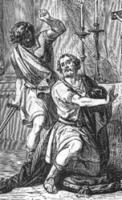 Boleslaus gathered some of these disaffected nobles around himself for several overlapping purposes. First of all, Wenceslaus was a threat to their paganism (unlike Wenceslaus, Boleslaus completely agreed with his mother's beliefs). Secondly, they considered Wenceslaus a "sell-out" if not an outright traitor to Czech heritage and governance. Finally, Boleslaus was next in line for the throne — something he strongly coveted.
Boleslaus gathered some of these disaffected nobles around himself for several overlapping purposes. First of all, Wenceslaus was a threat to their paganism (unlike Wenceslaus, Boleslaus completely agreed with his mother's beliefs). Secondly, they considered Wenceslaus a "sell-out" if not an outright traitor to Czech heritage and governance. Finally, Boleslaus was next in line for the throne — something he strongly coveted.
These factors led the younger brother to invite the elder to a celebration of the Feast of Saints Cosmas and Damian. On the way there, Boleslaus or his henchmen murdered Wenceslaus — the most commonly purported venue being at the very doors of the church toward which they traveled. Bolesaus claimed the title "Prince" — "Duke" being considered recognition of vassalage to the Holy Roman Empire.
Upon the death of Boleslaus I, his son Boleslaus II became Duke of Bohemia. Contrary to the father's nickname "the Cruel," the son embraced Christianity and became known as Boleslav the Pious. Included among his accomplishments was the establishment of the Bishopric of Prague.
 Meanwhile, the legend of Wenceslaus continued to grow in the telling. His piety and refusal to abandon Christianity remain part of the story of the Faith. The Church considered him a martyr and purported miracles followed his invocation. Thus, he was canonized as Saint Wenceslaus and remains primary patron of the Czech people and the Czech Republic.
Meanwhile, the legend of Wenceslaus continued to grow in the telling. His piety and refusal to abandon Christianity remain part of the story of the Faith. The Church considered him a martyr and purported miracles followed his invocation. Thus, he was canonized as Saint Wenceslaus and remains primary patron of the Czech people and the Czech Republic.
The carol Good King Wenceslas connects him with the earlier Saint Stephen and is based upon the general perception of his piety, humility, and desire to serve. Whether or not grounded in an actual event, it reflects the esteem in which the Czech people hold him.
Technorati Tags: Wenceslaus | Wenceslaus I of Bohemia | Saint Wenceslaus | Good King Wenceslas | Václav | Wenzel | Duke of Bohemia | Kníže of Bohemia | Kníze of Bohemia | Knize of Bohemia | Czech | Ludmila | Ludmilla | Drahomíra | Drahomira | Saint Cyril | Cyril and Methodius | Saint Methodius | Henry I of Germany | Henry the Fowler | Boleslaus | Boleslav | Boleslaus I | Boleslaus II | Boleslaus the Cruel | Boleslaus the Pious | Boleslav I | Boleslav II | Boleslav the Cruel | Boleslav the Pious | Saint Stephen | martyr | martyrdom | patron saint | Church Year | liturgical calendar | Christianity | Christian | Lutheranism | Lutheran | festivals | saints' days | biography | hagiography | commemorations | lectionary | theology | history | historical theology | Church history | Christian history | European history | Bohemian history | Czech history | Slavic history | Aardvark Alley
Lancelot Andrewes was born in London in 1555. Possessed of a keen intellect, he studied at Cambridge and Oxford, was a distinguished lecturer, and entered religious orders in 1580. A career that saw him enjoy working among the people while still challenging himself and others intellectually led to royal associations and eventual consecration as Bishop of Chichester in 1605 and a position as lord almoner. In 1618, he attended the Synod of Dort, was made dean of the Chapel Royal, and became Bishop of Winchester.
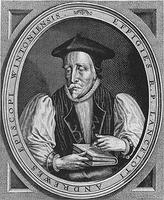 Active in church and secular politics, especially in their overlap, Andrewes advised James I of England and was on the committee of scholars responsible of the Authorized Version of the Bible. Indeed, his name is first on the list of translators, since he both provided translations of early parts of the Old Testament and served as an editor general of the entire work.
Active in church and secular politics, especially in their overlap, Andrewes advised James I of England and was on the committee of scholars responsible of the Authorized Version of the Bible. Indeed, his name is first on the list of translators, since he both provided translations of early parts of the Old Testament and served as an editor general of the entire work.
Versed in Latin, Greek, Hebrew and eighteen other languages, Andrewes enjoyed popularity during his life for writings. With Bishop Ussher, these two may have been the most learned and intellectually brilliant churchmen of the day. His apologetic writings included two essays against Robert Bellarmine. Large collections of his sermons remain and may still be read profitably both by lovers of Christ and by lovers of the English language.
Perhaps one of his finest works was the Preces Privatae (Private Prayers). The collection was, however, unavailable to contemporaries but were published after his death. Some sections are complete prayers and collects, other appear to be guides to devout meditation. A biography by James Kiefer includes quotes from the Preces. These selections from the Thursday prayers emphasize three important happenings on that day — the creation of birds and fish on the Fifth Day of Creation, the institution of the Lord's Supper, the Ascension of our Lord on Easter's 40th day.
Andrewes' impact on English arts and letters extended well beyond his life. T. S. Eliot considered him a major influence and wrote an essay in his honor.
Technorati Tags: Lancelot Andrewes | King James Version | KJV | King James Bible | Preces Privatae | Authorized Version | Authorized Version of the Bible | AV | Synod of Dort | James I of England | King James I | Bishop James Ussher | Bishop Ussher | Cardinal Bellarmine | Robert Bellarmine | T. S. Eliot | Church Year | liturgical calendar | Christianity | Christian | Lutheranism | Lutheran | biography | hagiography | commemorations | lectionary | theology | exegesis | exegetical theology | translation | Scripture | Bible | systematic theology | apologetics | polemics | history | historical theology | Church history | Christian history | Anglican history | English history | British history | European history
 To Russians, Sergius is both a national hero and an example of Russian spiritual life at its best. His posterity reminds us of Joan of Arc with the French or Martin Luther for Germans. He was born in Rostov (Rostoff) around 1314 to boyars Cyril and Maria and baptized Varfolomei (Bartholomew). The family moved closer to Moscow, settling in the village of Radonezh. Varfolomei became Sergius upon taking his monastic vows.
To Russians, Sergius is both a national hero and an example of Russian spiritual life at its best. His posterity reminds us of Joan of Arc with the French or Martin Luther for Germans. He was born in Rostov (Rostoff) around 1314 to boyars Cyril and Maria and baptized Varfolomei (Bartholomew). The family moved closer to Moscow, settling in the village of Radonezh. Varfolomei became Sergius upon taking his monastic vows.
When he was twenty — and after the deaths of his parents — Sergius left his inheritance to younger brother Peter. He joined his elder brother Stephan and began living as a hermit. When Stephan left to head the Pokrovsky monastery at Khotkovo, Sergius soon followed him. Others joined them in what became the Monastery of the Holy Trinity, a center for the renewal of Russian Christianity. Pilgrims came from all Russia to worship and to receive spiritual instruction, advice, and encouragement. At the time, Russians were largely controlled by the neighboring (non-Christian) Tatar (or Tartar) people, a group descended from the Mongol hordes. Sergius rallied the people behind Dmitri Ivanovich, who began an extended process of moving the Russians out from under Tatar rule.
 When Mongols under Mamai moved on Moscow, a Muscowian army, led by Dmitri, repulsed the invasion. Mamai escaped, established pacts with the Lithuanians and with Oleg, Kniaz of Rjazan, and led a larger force upon Moscow in 1380. Sergius blessed Prince Dmitri with the words, "Go fearless prince and believe in God's help." Dmitri led the Russians to victory at the Battle of Kulikovo, thus hastening the establishment of an independent Russia.
When Mongols under Mamai moved on Moscow, a Muscowian army, led by Dmitri, repulsed the invasion. Mamai escaped, established pacts with the Lithuanians and with Oleg, Kniaz of Rjazan, and led a larger force upon Moscow in 1380. Sergius blessed Prince Dmitri with the words, "Go fearless prince and believe in God's help." Dmitri led the Russians to victory at the Battle of Kulikovo, thus hastening the establishment of an independent Russia.
Despite his exhortations to battle and blessings upon prince and soldiers, Sergius possessed a winsome personality and was a gentle man. Accounts bear strong resemblance to those told of Francis of Assisi, including a special affinity which he and animals held for each other. He had the ability to inspire in men an intense awareness of the love of God, and a readiness to respond in love and obedience. Metropolitan Alexis of Moscow loved Sergius as a friend, entrusting him with such important tasks as peacemaking between rancorous princes. Despite rubbing shoulders with the wealthy and powerful, he remained close to his peasant roots. One contemporary said of him, "He has about him the smell of fir forests." To this day, his effect on Russian devotion remains considerable.
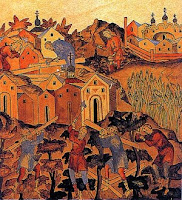 The life and work of Venerable Sergius have a special place in the history of Russian monasticism. His cloister served as an example of secluded ascetic life for later monasteries. Starting from scratch, the monastery first needed almost everything: Chasubles were hand painted, chalices were made of wood, they burned splinters instead of candles for light in church. Still, devotees were zealous and Sergius was a model of asceticism, deep humility, and staunch faith in God's help. He was a true leader in work and services and the monks followed his example.
The life and work of Venerable Sergius have a special place in the history of Russian monasticism. His cloister served as an example of secluded ascetic life for later monasteries. Starting from scratch, the monastery first needed almost everything: Chasubles were hand painted, chalices were made of wood, they burned splinters instead of candles for light in church. Still, devotees were zealous and Sergius was a model of asceticism, deep humility, and staunch faith in God's help. He was a true leader in work and services and the monks followed his example.
The blessing of Dmitri and the prince's subsequent success encouraged Russian nobles to contribute to the support of Holy Trinity Monastery. In the following years, peasants started settling nearby. Because of its location near a main road to Moscow and points north, it gained even greater financial support. Increased income to these ascetics meant increased giving, leading the monks of Holy Trinity to follow the example of the Kiev-Pechora monastery in generous almsgiving and the provision of shelter and support for sick and traveling people.
 Sergius's renown spread as far abroad as Constantinople, from whence Patriarch Philotheus sent him his blessing. The patriarch also produced a written endorsement decreeing that monasteries under Sergius would henceforth use the new rules of community cloister life established by the founder of Holy Trinity.
Sergius's renown spread as far abroad as Constantinople, from whence Patriarch Philotheus sent him his blessing. The patriarch also produced a written endorsement decreeing that monasteries under Sergius would henceforth use the new rules of community cloister life established by the founder of Holy Trinity.
Two major convents on the outskirts of Moscow preserve the recollection of the freedom for which he urged Dimitri to fight. One is the fortress of the Donskoi Monastery, under the Sparrow Hills. The other is the Simonov Monastery on the banks of the Mosqua — a place of beauty chosen by the saint himself and established in 1370 by monk Feodor, a nephew and disciple of St. Sergius.
When eighty-four year old Metropolitan Alexis knew his life was ending, he desired to give Sergius his blessing while also appointing him as successor. But the humble monk, in great alarm, declared that he could not accept the honor. Saint Sergius died at an extremely advanced age in 1392, to the almost universal sorrow of the Russian people.
Suggested Lection
Psalm 34:1-8 or 33:1-5, 20-21
Ecclesiasticus 39:1-9
Matthew 13:47-52
Suggested Collect
O God, whose blessed Son became poor that we through His poverty might be rich, deliver us, we pray, from an inordinate love of this world, that we, inspired by the devotion of Your servants such as Sergius of Moscow, may serve you with singleness of heart, attaining to the riches of the age to come; through Jesus Christ our Lord, who lives and reigns with You and the Holy Spirit, one God, now and forever.
Technorati Tags: Saint Sergius | Saint Sergius of Radonezh | Venerable Sergius | Sergius Abbot of Holy Trinity | St. Sergius | Sergius | Varfolomei | Bartholomew | monk | monasticism | Holy Trinity Monastery | Monastery of the Holy Trinity | Dmitri Donskoi | Dmitri Ivanovich | Feodor | Metropolitan Alexis of Moscow | Metropolitan Alexis | Patriarch Philotheus | Mamai Khan | Mamai | Tatar | Tartar | Mongol | Russian nationalism | Russia | Radonezh | Moscow | Donskoi Monastery | Simonov Monastery | liturgical calendar | Church Year | Christianity | orthodox Christianity | Orthodox Church | Russian Orthodox Church | Russian Orthodoxy | Eastern Orthodoxy | Christian | Lutheranism | Lutheran | festivals | saints' days | Scripture | Bible | biography | hagiography | commemorations | lectionary | Baptism | Holy Baptism | baptismal theology | theology | systematic theology | history | historical theology | Church history | Christian history | Orthodox history | European history | Asian history | Russian history | Tatar history | Battle of Kulikovo
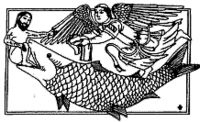 A singular prophet among the many in the Old Testament, Jonah the son of Amittai was born about an hour's walk from Nazareth. His prophetic ministry involved a call to preach at Nineveh, capital of pagan Assyria (Jonah 1:1-2). His reluctance to respond and God's insistence that His call be heeded is the story of the book that bears Jonah's name.
A singular prophet among the many in the Old Testament, Jonah the son of Amittai was born about an hour's walk from Nazareth. His prophetic ministry involved a call to preach at Nineveh, capital of pagan Assyria (Jonah 1:1-2). His reluctance to respond and God's insistence that His call be heeded is the story of the book that bears Jonah's name.Although the swallowing and disgorging of Jonah by the great fish is the most remembered detail of his life, the book address it in only three verses (Jonah 1:17; 2:1, 10). The important theme is how God deals compassionately with sinners. God spared sinful Ninevah — for a time. Eventually, their evil returned and brought about their eventual destruction.
The Lord also dealt mercifully with sinful Jonah who resisted God's call and fled toward Tarshish to escape it, who resented the Lord graciously saving the savage Assyrians, and who sat and sulked about their deliverance, saying, "I knew that you are a gracious God and merciful, slow to anger and abounding in steadfast love, and relenting from disaster. (Jonah 4:2)"
Jonah's three day sojourn in the belly of the fish is mentioned by Jesus as a sign of His own death, burial, and resurrection (Matthew 12:39-41).
Technorati Tags: Jonah | Prophet Jonah | great fish | whale | Assyria | Ninevah | Tarshish | grace | mercy | Jesus | Jesus Christ | Christ | resurrection | prophecy | prophet | typology | Scripture | Bible | Old Testament | Bible history | Church Year | liturgical calendar | sanctorial calendar | Christianity | Christian | Lutheran | Lutheranism | confessional Lutheran | Christian feasts | saints' days | biography | hagiography | saint | commemorations | lectionary | exegetical theology
One day Jesus was walking and saw a tax collector named Matthew sitting at a tax collection post, and said to him, "Follow Me." Matthew stood up and followed Him, becoming one of His twelve apostles (see Matthew 9:9-13; parallels Mark 2:13-17 and Luke 5:27-32).
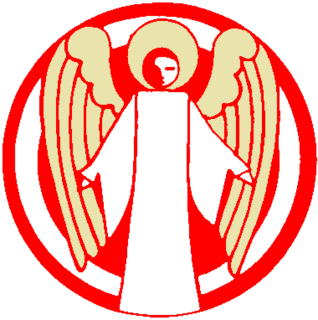 Tax collectors in those days were social outcasts. Devout Jews avoided them because they were usually dishonest (they were expected to make their profits by cheating the people). Nationalistic Jews hated them because they were agents of the Roman government and doubly hated them if (like Matthew) they were Jews, because they had gone over to the enemy, betraying their own people for money.
Tax collectors in those days were social outcasts. Devout Jews avoided them because they were usually dishonest (they were expected to make their profits by cheating the people). Nationalistic Jews hated them because they were agents of the Roman government and doubly hated them if (like Matthew) they were Jews, because they had gone over to the enemy, betraying their own people for money.
Throughout the Gospels, we find tax collectors (publicans) mentioned as a standard type of sinful and despised outcast. Matthew brought many of his former associates to meet Jesus. They — as well as social outcasts and sinners in general — were shown that the love of God through His Son extended even to them.
The word Gospel comes from the Old English god-spell, or good tidings. The New Testament's Greek speaks of the euangelion (ευαγγελιον), a "good message." In English, this "Evangel" gives us words like evangelism and evangelist. From it we also received "Evangelical," which means "of or pertaining to the Gospel," via Germany. There, it was first applied to Martin Luther and his compatriots and later co-opted by the Calvinists and others.
Certainly Matthew and his companions freed of sin and guilt by Jesus experienced this Good News — as do all others who trust in the forgiveness of sins for Christ's sake. The word angel is related, for an angelos (αγγελος) is a messenger.
The name "Matthew" means "gift of the Lord." Mark and Luke, in the story of his calling, name him "Levi." Perhaps this was his original name, and he received a new name from Jesus when he became a disciple. Perhaps he was a member of the tribe of Levi. Of Matthew's life after Pentecost, the Scriptures tell us nothing. Later accounts vary: Some report that he was martyred, others that he died a natural death. The Christian community since early times has commemorated him as a martyr.
Matthew's symbol in religious art is often a winged man, such as shown here. This representation comes from the visions of Ezekiel and John of the four living creatures around the throne of God (see examples in Ezekiel 1:5-14 and Revelation 4:6-11). While there is some variation in Christendom, we most often find the man standing for Matthew since his narrative begins with Jesus' human genealogy of Jesus. Also, Matthew often quotes Christ speaking of Himself as "the Son of Man." The lion represents Saint Mark, whose narrative begins with John the Baptist crying out in the desert, perhaps as a lion roars in the wilderness. The ox, a sacrificial animal, stands for Saint Luke, whose narrative begins in the Temple and is woven throughout with Jesus pointing Himself toward His own sacrificial death. Finally, the eagle often represents Saint John. John begins his narrative in Heaven with the eternal Word of God while also writing the Fourth Gospel in a soaring style.
Lection
Psalm 119:33-40
Ezekiel 2:8-3:11
Ephesians 4:7-16
Matthew 9:9-13
Collect
O Son of God, our blessed Savior Jesus Christ, You called Matthew the tax collector to be an apostle and evangelist. Through his faithful and inspired witness, grant that we also may follow You, leaving behind all covetous desires and love of riches; for You live and reign with the Father and the Holy Spirit, one God, now and forever.
Technorati Tags: Saint Matthew | Matthew | St. Matthew | Levi | evangelist | apostle | publican | tax collector | Jesus | Jesus Christ | Christ | disciple | sinners | four living creatures | Son of Man | martyrdom | martyr | Church Year | liturgical calendar | sanctorial calendar | Christianity | Christian | Lutheran | Lutheranism | Christian feasts | festivals | saints' days | biography | hagiography | commemoration | historical theology | exegetical theology | Church history | Bible history | Bible | Scripture | New Testament | Gospel | Gospels | Evangel | Good News | angel | winged man | ecclesiastical art | Christian symbol | symbolism
 Cyprian (Thascius Caecilius Cyprianus) was born around AD 200 in the north African city of Carthage to a well-established pagan family. Most scholars believe that he came from either Punic or Berber stock. That he was of the privileged class may be shown, in part, from his place of death: He was martyred in his own villa.
Cyprian (Thascius Caecilius Cyprianus) was born around AD 200 in the north African city of Carthage to a well-established pagan family. Most scholars believe that he came from either Punic or Berber stock. That he was of the privileged class may be shown, in part, from his place of death: He was martyred in his own villa.
After receiving a quality (albeit pagan) education, Cyprian became a Christian and was baptized sometime between 245 and 248. He passed quickly through the ranks of clergy, being ordained in short order as deacon, then presbyter. Election and consecration as Bishop of Carthage followed in short order, sometime during 248 or 249. This delighted the poor of the community, who'd benefited greatly from Cyprian giving away much of his wealth after his baptism, but a party in the Carthage church opposed him throughout his episcopacy.
During the persecution of Roman Emperor Decius, Cyprian fled Carthage but returned two years later. During his absence, some accused him of cowardice or lack of faith while others defended him for remaining alive to help govern the church. His own testimony was that he acted as God willed him to do through visions and divine commands. From hiding, he remained a faithful ruler of his flock, acting through a deacon brave enough to carry his words back to Carthage.
Upon his return from exile, Cyprian had to deal with the problem of Christians who had lapsed from their faith under persecution and now wanted to return to the Church. He decided that they could be restored, but that restoration would come only after a period of penance demonstrating their faithfulness. During the following years, Cyprian also became part of the debate over the efficacy of baptism administered by heretics. While some said only the form was essential, Cyprian claimed that even if all the words and actions were correct, it was no baptism if administered outside the Church. Therefore, Cyprian directed that any who were baptized in heretical sects would be given Christian baptisms before being joined to the Church. A majority of the North African bishops agreed with him, but this rigorous interpretation of dogma was later moderated by the Church.
His position in the matter of heretic baptisms places him squarely among many North African theologians of the period. He seems to be a way station between the strictness of Tertullian and the even more extreme doctrinal interpretations of the Donatists, who concerned themselves with the efficacy of the Lord's Supper being administered by a priest who lapsed or recanted the faith during times of persecution.
During persecution under Emperor Valerian, Cyprian first went into hiding and later gave himself up to the authorities. He was beheaded for the faith in Carthage in the year 258. According to witnesses, his only words upon hearing the death sentence pronounced were, "Thanks be to God!"
Besides fulfilling his pastoral and episcopal obligations, Saint Cyprian gave himself to theological writing. His most noted work was De unitate ecclesiae, where he professed belief in one episcopate — not that of Rome, but of the Church at large — as the foundation of the Church. In this treatise he wrote, "He can no longer have God for his Father who has not the Church for his mother; ... he who gathers elsewhere than in the Church scatters the Church of Christ." In the same work, he also said, "Nor is there any other home to believers but the one Church." Unlike some of his contemporaries, especially those who may have acted out of jealousy over his popularity, most modern scholars and average Christians who study him are left with a quite favorable impression of the man.
Note: The liturgical calendar of The Lutheran Church — Missouri Synod transfers the commemoration of Saint Cyprian to this day since 14 September is Holy Cross Day. This is in line with the practice of much of the Christian Church.
Lection
Psalm 23 or 116:10-17
1 Peter 5:1-4, 10-11
John 10:11-16
Collect
Almighty God, who gave Your servant Cyprian boldness to confess the Name of our Savior Jesus Christ before the rulers of this world and courage to die for this faith, grant that we may always be ready to give a reason for the hope that is in us, and to suffer gladly for the sake of our Lord Jesus Christ; who lives and reigns with You and the Holy Spirit, one God, now and forever.
Technorati Tags: Cyprian of Carthage | Saint Cyprian of Carthage | Saint Cyprian | St. Cyprian | Cyprian | Carthage | Berber | Decius | Decian persecution | Valarian | Valarian persecution | Donatism | Tertullian | Church Year | liturgical calendar | Christianity | orthodox Christianity | Christian | Lutheranism | Lutheran | festivals | saints' days | Scripture | Bible | biography | hagiography | commemorations | lectionary | Baptism | Holy Baptism | baptismal theology | theology | systematic theology | history | historical theology | Church history | Christian history | African history | North African history | Tunisian history | Carthingian history | Roman history
 During the reign of Constantine the Great, the first Roman Emperor to profess the Christian faith, his mother Helena went to Israel, hoping to find the places especially significant to Christians. Having located, close together, what she believed to be the sites of the Crucifixion and of the Burial (at locations that many modern archaeologists think may be correct), she then had built over them the Church of the Holy Sepulcher, which was dedicated on 13 September 335.
During the reign of Constantine the Great, the first Roman Emperor to profess the Christian faith, his mother Helena went to Israel, hoping to find the places especially significant to Christians. Having located, close together, what she believed to be the sites of the Crucifixion and of the Burial (at locations that many modern archaeologists think may be correct), she then had built over them the Church of the Holy Sepulcher, which was dedicated on 13 September 335.
On the next day, the purported section of the cross was brought outside the church for others to view. Thus began a day for recognizing the cross of Christ in a festal atmosphere that would be inappropriate on Good Friday. It stands as a symbol of triumph, as a sign of Christ's victory over death, and a reminder of His promise, "And I, when I am lifted up from the earth, will draw all people to myself. (John 12:32)"
The day is known by different names in various parts of Christendom. The Eastern Orthodox and Eastern Rite Catholic Churches know it as "Feast of the Exaltation of the Cross" while the Latin Rite of the Roman Catholic Church calls it the "Triumph of the Cross." Most other liturgical churches simply call it "Holy Cross Day."
 The Christian custom of tracing the sign of the cross on people and things as a sign of blessing is very old. Some think that it goes back to the very origins of Christianity and earlier. In Ezekiel 9, we read that Ezekiel had a vision of the throne-room of God, in which an angel was sent to go through Jerusalem and put a mark on the foreheads of the faithful few who mourned for the sins of the city. Afterwards, other angels were sent through the city to destroy all those who had not the mark.
The Christian custom of tracing the sign of the cross on people and things as a sign of blessing is very old. Some think that it goes back to the very origins of Christianity and earlier. In Ezekiel 9, we read that Ezekiel had a vision of the throne-room of God, in which an angel was sent to go through Jerusalem and put a mark on the foreheads of the faithful few who mourned for the sins of the city. Afterwards, other angels were sent through the city to destroy all those who had not the mark.
We find similar visionary material in Revelation 7:2-4; 9:4; and 14:1, where the mark on the forehead again protects the faithful few in the day of wrath. There, it is said to be the name of the Lamb and of His Father.
What is the significance of the sign of the cross? In the first place, we often place our initials or other personal mark on something to show that it belongs to us. The cross is the personal mark of Our Lord Jesus Christ, often traced upon our foreheads and hearts at our baptisms. We mark it on ourselves as a sign that we belong to Him, just as in the book of Revelation, as noted above, the servants of God are sealed or marked on their foreheads as a sign that they are His.
As one preacher said, if you were telling someone how to make a cross, you might say, "Draw an 'I' and then cross it out." As we make the sign, we first draw a vertical stroke, as if to say to God, "Lord, here am I." Then we cancel it with a horizontal stroke, as if to say, "Help me, Lord, to abandon my self-centeredness and self-will; make Yourself the center of my life instead. Fix all my attention and all my desire on You, Lord, that I may forget my self, cancel my self, abandon myself completely to Your love and service."
Lection
Psalm 40:1-11
Numbers 21:4-9
1 Corinthians 1:18-25
John 12:20-33
Collect of the Day
Merciful God, Your Son, Jesus Christ, was lifted high upon the cross that He might bear the sins of the world and draw all people to Himself. Grant that we who glory in His death for our redemption may faithfully heed His call to bear the cross and follow Him, who lives and reigns with You and the Holy Spirit, one God, now and forever.
Technorati Tags: Holy Cross Day | Exaltation of the Cross | Feast of the Exaltation of the Cross | Triumph of the Cross | Constantine the Great | Helena | crucifixion | Church of the Holy Sepulcher | Jerusalem | Palestine | Holy Land | sign of the cross | Cross of Christ | true cross | Jesus | Jesus Christ | Christ | Church Year | liturgical calendar | Christianity | Christian | Lutheran | Lutheranism | Christian feasts | commemorations | lectionary | historical theology | Church history | Roman history | Middle Eastern history | Palestine history
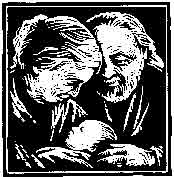 Zechariah (or Zachariah) and Elizabeth were "righteous before God, living blamelessly according to all the commandments and regulations of the Lord. (Luke 1:6)" The angel Gabriel greeted Zechariah, a priest in the temple in Jerusalem, announcing that Zechariah and Elizabeth would become parents of a son. Initially he didn't believe Gabriel because of their old age. For this, Zechariah became unable to speak.
Zechariah (or Zachariah) and Elizabeth were "righteous before God, living blamelessly according to all the commandments and regulations of the Lord. (Luke 1:6)" The angel Gabriel greeted Zechariah, a priest in the temple in Jerusalem, announcing that Zechariah and Elizabeth would become parents of a son. Initially he didn't believe Gabriel because of their old age. For this, Zechariah became unable to speak.
After their son was born, Elizabeth named the boy John, which means "Yahweh (the Lord) is gracious." As friends and relatives sought to change her mind, thinking that he should be named for someone in their family, they asked Zechariah to write down what the boy's name should be. Suddenly, his voice returned and he confirmed his wife's choice.
 In response to receiving his son and the return of his voice, Zechariah sang the Benedictus. This canticle beautifully summarizes God's Old Testament promises and predicts John's work as forerunner to the Messiah, who would be born in three more months (Luke 1:68-79).
In response to receiving his son and the return of his voice, Zechariah sang the Benedictus. This canticle beautifully summarizes God's Old Testament promises and predicts John's work as forerunner to the Messiah, who would be born in three more months (Luke 1:68-79).
We remember the faithful and pious examples of Zechariah and Elizabeth and honor them for raising the last great prophet of the coming Christ, Saint John the Baptist.
Those familiar with older English language Bibles might remember them slightly differently. That's because the Authorized Version (King James) and some other translations use the Greek form of their names, calling them Zacharias and Elisabeth.
The Benedictus
Blessed be the Lord God of Israel,
for he has visited and redeemed his people
and has raised up a horn of salvation for us in the house of his servant David,
as he spoke by the mouth of his holy prophets from of old,
that we should be saved from our enemies
and from the hand of all who hate us;
to show the mercy promised to our fathers
and to remember his holy covenant,
the oath that he swore to our father Abraham,
to grant us that we, being delivered from the hand of our enemies,
might serve him without fear,
in holiness and righteousness before him all our days.
And you, child, will be called the prophet of the Most High;
for you will go before the Lord to prepare his ways,
to give knowledge of salvation to his people
in the forgiveness of their sins,
because of the tender mercy of our God,
whereby the sunrise shall visit us from on high
to give light to those who sit in darkness and in the shadow of death,
to guide our feet into the way of peace.
Technorati Tags: Zechariah | Zachariah | Zacharias | Elizabeth | Elisabeth | Gabriel | The Angel Gabriel | Saint John the Baptist | John the Baptist | Saint John the Baptizer | John the Baptizer | Benedictus | Church Year | liturgical calendar | sanctorial calendar | Christianity | Christian | Jesus | Jesus Christ | Christ | Lutheran | Lutheranism | Christian feasts | festivals | saints' days | biography | hagiography | commemoration | historical theology | exegetical theology | Church history | Bible history | Bible | Scripture | New Testament

